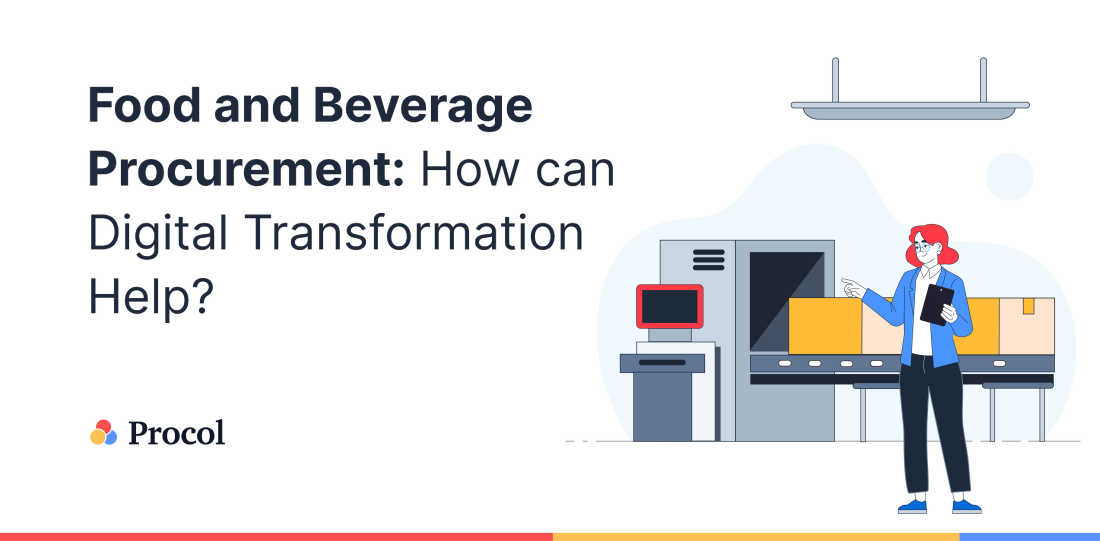Food and Beverage Procurement: How can Digital Transformation Help?

TABLE OF CONTENTS
Introduction
Food wholesalers, manufacturers, restaurants, and other food businesses frequently divide their time between collecting raw food and beverage supplies and combining or preparing them into completed foods. The end product is vital, but you must also evaluate the ingredients’ quality, nutrition, and purity. As a result, purchasing represents a significant area of strategic growth for most food firms. Selecting the proper vendors and ingredients and maintaining that connection may considerably influence your firm’s profitability and image.
According to McKinsey, in recent times, the top names in every CPG sector have contributed just 25% of value increase across Nielsen-covered platforms in the United States. However, small & medium-sized companies accounted for 45% of development, whereas private-label items accounted for 30%.
7 Tips for Food and Beverage Purchasing
1. Balance Quality & Price
Balancing price and quality is the most crucial decision you’ll make when purchasing food. If you choose the finest quality possible, you may end up being unable to make a profit, but when you buy too cheap, no one will desire to purchase your items. Instead, look for a happy medium: suppliers that can provide you with a decent bargain on food goods that meet the demands and preferences of your intended audience. For some businesses, this may include purchasing locally or via responsible farms. Others may need to look globally for the ideal grown component. Consider how the price of each item will affect your bottom line.
According to McKinsey’s 2020 study, slightly more than three-quarters of participants said they intended to strengthen resilience by physically modifying their supply-chain structures. This year, the vast majority (92%) have performed likewise.
2. Select Dependable Vendors
You must select vendors who are dependable in numerous aspects. They must transport your items on time, each moment, without getting prompted and without mistakes, so you may better manage your processes. Vendors must adhere to high health and safety standards to assure you of uncontaminated goods. They must also be reachable in case of an issue or if you require an emergency restock. Only deal with vendors you trust; spending a bit more for that connection is occasionally worth it.
3. Examine the Details
Examine every detail before finalising a transaction. If possible, visit the supply chain facility to check your operational requirements and equipment. Evaluate all aspects and look into the corporation’s history to ensure you aren’t overlooking anything significant. Several food and beverage producers set fixed raw material costs, but it’s typically not a bad idea to try to bargain. If you’re looking for a better bargain, they could be ready to give you a discount depending on bulk buying volumes or the longer-term agreement. Any wiggle space you obtain here would lead to more significant revenue for your company.
4. Get a Stock Replenishment Process in Place
You must specify when and how your stock will need to be supplied in the contract. This is among the most critical operational factors for a food and beverage maker; if you lack good ingredients on hand, you won’t be capable of continuing manufacturing. You and your vendor must have a shared and precise knowledge of when purchases will be made, when they will ship, and when they will arrive. There is no space for misunderstanding here. If at all feasible, strive to streamline your e-procurement connections.
Collaborating with five distinct vendors may assist you in obtaining the most fantastic pricing, but it could also add hundreds of additional hours in paperwork. In your supplier relationships, aim for simplicity. Accenture estimates that process optimisations saved $217 million in the working capital, a 34% increase. Improved efficiency, analytics, and automation contributed to better customer payment handling.
5. Prepare & Double-Check Contracts
Unofficial contracts may appear simpler, but a definite contract is required for significant operations. Set a period for the partnership, specified quality standards and operating methods, and, of course, the agreed-upon pricing. Before agreeing, double-check everything.
6. Maintaining Adaptability
Maintaining your suppliers as much as possible is a fantastic strategy to assure product consistency and alleviate the burden of finding new suppliers. Yet, it will be best if you also recognise that situations will change over time. You’ll most likely have to adjust your food and beverage purchase rules and suppliers several times throughout your company’s existence, and the more adaptive you are, the more remarkable.
7. Put Dependability First
Few things may derail a day’s performance more than a scarcity of necessary materials owing to late delivery or a missed shipment. Its organisation, without question, values consistency and responsibility, and you must demand the same from your product sellers. Communication is crucial in this case, as it is in several others. In this age of “new normality,” supply chain interruptions have grown more regular. Therefore, some disruptions are inevitable. Confirm with your vendors that they will contact you promptly in these situations so that you may plan or find another source.
Final Takeaway
Even for smaller organisations, purchasing within the food and beverage sector sometimes involves many vendors. Whether you run a restaurant, a food manufacturing company, or any other type of business, you likely need a range of food items and ingredients, and you won’t be able to get these from just one or two vendors. Due to this, effective purchasing procedures are crucial.
Procol is a fast-growing procurement software which manages thousands of transactions across a trusted community of suppliers and buyers. Schedule a demo to understand its novel techniques to develop adaptable procurement strategies that address unanticipated and growing supply chain networks.
Get a Free Demo
We'd love to hear from you. Please fill out this form to schedule a demo with us. You can also give a call on +91 76666 82222



